In Alexandre Aja’s latest horror thriller Never Let Go, Halle Berry plays a fiercely protective mother trying to safeguard her twin sons from an evil force in a post-apocalyptic world. The premise is familiar: a family living in isolation, following strict rules to evade an evil that lurks outside their cabin in the woods. But while there’s taut tension, Never Let Go tries to juggle too many competing ideas and feels like a mishmash of things one has seen before in the genre.
Set in a remote, rundown shack in the woods, Never Let Go wastes little time establishing its primary rule: always stay connected to the home via a rope when venturing outside. If the rope breaks or the boys let go of it, they risk being consumed by a shapeshifting evil that only the mother can see. The presence of an invisible danger is reminiscent of the John Krasinski-Emily Blunt-starrer A Quiet Place. Aja’s choice to hide the evil from the children — and by extension, from the audience — builds early intrigue, but as the story unfolds, this tension unravels.
Berry’s unnamed character is determined to protect her sons, Nolan (Percy Daggs IV) and Samuel (Anthony B. Jenkins), and the film initially plays on the tension between protection and paranoia. Nolan, the more sceptical of the two, begins to question his mother’s claims, while Samuel remains unwavering in his trust. As food supplies dwindle and the isolation hits them hard, the question that stares in the face is, is the mother shielding her sons from a real danger, or has her mind been twisted by trauma and fear?
The first act of the film excels at building atmosphere, with Aja leaning into his knack for horror aesthetics. The dark, claustrophobic interiors of the cabin and the ominous woods create a sense of unease. Cinematographer Maxime Alexandre plays with the shadows, suggesting movement in the background that heightens the tension. The visual language speaks louder than the dialogue at times, as we catch a glimpse of something — or nothing — lurking just beyond sight.
Thematically, Never Let Go offers a slew of ideas — mental illness, overprotection, inherited trauma, and even thinly veiled Covid allegories with its emphasis on staying ‘tethered’ to safety. But in trying to tackle so much, the film ends up saying too little. There are echoes of M. Night Shyamalan’s earlier works, particularly in its reliance on a twist that fails to stick the landing.
Berry’s character is haunted by visions of her abusive mother and her deceased husband, manifestations of the evil that plagues her. These psychological layers, while intriguing, feel underdeveloped. But Berry’s performance is as committed as ever, grounding the film with a fierce intensity. She treads a thin line between a mother’s genuine love and her unbridled need to control. Daggs is impressive as Nolan, especially as his doubt grows, and his quiet rebellion against his mother’s authority adds another dimension to the story.
At its best, Never Let Go keeps us guessing. The early ambiguity about whether the evil is real or imagined injects a fresh layer of suspense into an otherwise predictable setup. A particular scene involving the family dog makes for a fantastic moment of edge-of-the-seat tension.











